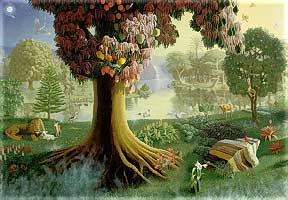 So far I have discussed the Germanic and Latin roots of the English words freedom and liberty. These histories certainly affect our conceptions of these words as we read verses such as, “Where the Spirit is, there is liberty,” and “If the Son shall make you free, you shall be free indeed.” These ancient “folkways,” as David Fisher Hackett defines them, may have influenced scripture interpretation as the Word was translated into English and German, but I will explore that later. First, I would like to present one possible model of liberty in Christ.
So far I have discussed the Germanic and Latin roots of the English words freedom and liberty. These histories certainly affect our conceptions of these words as we read verses such as, “Where the Spirit is, there is liberty,” and “If the Son shall make you free, you shall be free indeed.” These ancient “folkways,” as David Fisher Hackett defines them, may have influenced scripture interpretation as the Word was translated into English and German, but I will explore that later. First, I would like to present one possible model of liberty in Christ.In the beginning, God created the heavens and the Earth (Genesis 1:1). God purposed to make man in His own image in order to take dominion of the earth (Genesis 1:26). Then God created man from the dust of the Earth and breathed into his nostrils the breath of life (Genesis 2:7). Finally, God pronounced His completed creation to be “very good” (Genesis 1: 31). Everything was according to His plan.
What was life like for Adam and Eve in this perfect world? It is impossible to know fully, but I believe there are principles to be drawn from these and other passages in scripture. These principles provide insight into their pre-fall days and hence into the nature of our lives in Christ
First, we know man was created for a purpose: to tend the garden and take dominion of the earth. His days were not full of idle wandering, admiring the magnificent view and partaking of the luscious fruit. These things existed, but as a fruit of his labor. I think it also significant to note that no man was set as an authority over Adam and Eve. Nor were Adam and Eve set as an authority over anyone else. In fact, Adam’s ruling of his wife was a consequence of the fall (Genesis 3: 16). The ability for a man to govern another man otherwise does not appear to have existed prior to Noah stepping off the ark (Genesis 9:5-6).
So how is man to be governed? Government, according to Webster’s 1828 dictionary contains four elements: direction, regulation, control and restraint. When God created Adam, He gave instruction. When man disobeyed, He regulated his access to the garden and the Tree of Life. Within the garden, man was never controlled nor restrained. His submission was voluntary. The government rested on His shoulders and, as we read in Isaiah 9:6, it will again. This is the essence of Christian self-government, that we submit ourselves to the instruction of God. Or, put another way, that we are governed internally by the indwelling of the Holy Spirit. We are directed, and at times regulated, but we are not restrained nor controlled. This, I believe, is the model of liberty provided in Genesis one and two and has implication for our lives in Christ both now and in Heaven.
Previous posts in this series:
Freedom: An Ancient Custom of Rights and Responsibilities
Liberty: The Roman System of Acquired Privilege
For more on Christian self-government:
The key to Christian self-government, by principledmom
Rudiments II: Internal and External, by Shannon
And just an interesting post on the fall.
christian liberty, christian, liberty, Garden of Eden, Eden, government
